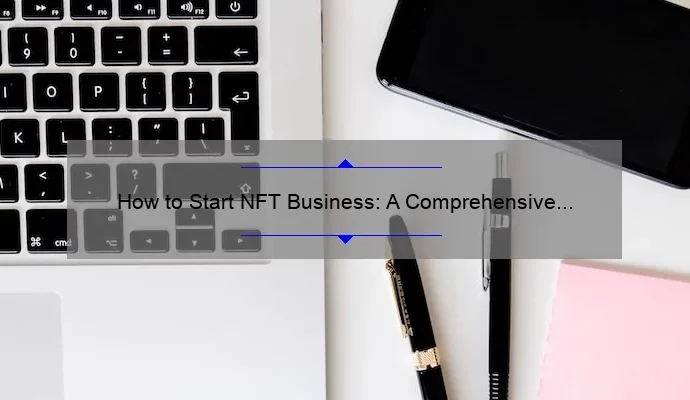Resposta curta: como iniciar um negócio de NFT Para iniciar um negócio de NFT (tokens não fungíveis), siga estes passos: 1. Familiarize-se com o conceito de NFT e seu funcionamento. 2. Identifique uma área ou nicho em que você deseja criar e vender seus próprios NFTs. 3. Escolha a blockchain mais adequada para suas necessidades,
Resposta curta: como iniciar um negócio de NFT
Para iniciar um negócio de NFT (tokens não fungíveis), siga estes passos:
1. Familiarize-se com o conceito de NFT e seu funcionamento.
2. Identifique uma área ou nicho em que você deseja criar e vender seus próprios NFTs.
3. Escolha a blockchain mais adequada para suas necessidades, considerando fatores como segurança, escalabilidade e custos.
4. Crie sua arte digital exclusiva ou adquira direitos autorais sobre obras existentes para transformá-las em NFTs.
5. Utilize plataformas especializadas em venda de NFTs, como OpenSea ou Rarible, para listar e comercializar seus tokens únicos.
6. Promova sua coleção por meio das redes sociais, blogs e comunidades relevantes para alcançar potenciais compradores interessados em suas criações.
7. Mantenha-se atualizado sobre as tendências do mercado de NFTs e esteja aberto a adaptar sua estratégia conforme necessário.
Lembre-se sempre de conduzir pesquisas adicionais detalhadas antes de tomar decisões importantes relacionadas ao início do seu próprio negócio de NFT.
Understanding the Basics: How to Start an NFT Business
Understanding the Basics: How to Start an NFT Business
Are you intrigued by the booming world of Non-Fungible Tokens (NFTs) and want to jump on the bandwagon? Starting an NFT business can be a lucrative venture if done right. However, it’s essential to grasp the fundamental concepts and strategies behind this digital phenomenon before diving headfirst into the market. In this article, we will guide you through the basics of how to start an NFT business, equipping you with valuable knowledge that will help kickstart your journey in this exciting realm.
First off, let’s break down what exactly an NFT is. Unlike cryptocurrencies such as Bitcoin or Ethereum, which are fungible tokens that can be exchanged on a one-to-one basis, Non-Fungible Tokens represent unique digital assets. These tokens utilize blockchain technology to provide proof of ownership and authenticity for various types of creative works, including artwork, music, videos, virtual real estate, collectibles, and even virtual characters in video games.
Now that we understand what NFTs are let’s explore steps on how to get started with your own NFT business:
1. Identify Your Niche: As with any business venture, finding your niche is crucial in standing out from the crowd and attracting potential buyers. Determine which type of digital assets you want to specialize in – artwork, music, collectibles – and create a unique selling point that sets your offerings apart from others.
2. Create Compelling Content: To attract collectors or investors interested in purchasing your NFTs, focus on creating high-quality content. Whether it’s eye-catching visuals for artwork or innovative soundscapes for music pieces—ensuring excellence in your digital assets will significantly enhance their value within the market.
3. Choose an Appropriate Blockchain Platform: Selecting the right blockchain platform is vital as it determines where you’ll mint and sell your NFTs. Ethereum remains the most popular platform for NFTs, but other alternatives like Binance Smart Chain and Flow are gaining traction. Research these platforms, evaluate their features, transaction fees, and user base to make an informed decision.
4. Mint Your NFTs: Minting refers to the process of creating your NFTs on a blockchain. Once you’ve chosen your preferred platform, follow their guidelines on uploading digital assets and linking them to smart contracts that represent your tokens. Keep in mind that certain platforms may require gas fees or verification before minting.
5. Establish Digital Wallets: To seamlessly manage your NFTs and facilitate transactions, set up digital wallets compatible with your chosen blockchain platform. These wallets will serve as secure storage for your creations while allowing buyers to send payments directly to you.
6. Create a Marketing Strategy: No matter how exceptional your NFTs are, they won’t gain attention without proper promotion. Develop a marketing strategy tailored to reach potential buyers within your chosen niche. Utilize social media platforms, collaborate with influencers or artists in related fields, join NFT marketplaces, and engage with communities interested in similar digital assets.
7- Engage with the Community: Building connections within the thriving NFT community can be highly beneficial for gaining exposure and enhancing credibility. Attend virtual conferences or events related to NFTs, join online forums or Discord channels dedicated to this industry, initiate conversations with collectors or investors – all of these interactions contribute not only to expanding knowledge but also enhancing networking opportunities.
Launching an NFT business requires strategic planning and continuous adaptation as the industry evolves rapidly. Stay updated with trends, consumer preferences, and emerging technologies related to blockchain and digital collectibles –this will give you an edge in navigating this dynamic marketplace successfully.
Remember that perseverance is key; building a successful NFT business takes time as you establish yourself within the competitive ecosystem of creators and innovators dealing in unique digital assets. Embrace this exciting realm, embrace the possibilities of creating something extraordinary, and embark on your journey knowing that you’re paving the way for the future of digital ownership.
Step-by-Step Guide: How to Launch Your Own NFT Business
Are you ready to step into the exciting world of non-fungible tokens (NFTs) and launch your own NFT business? Look no further! In this comprehensive step-by-step guide, we will walk you through the entire process of starting your own NFT venture. From understanding what an NFT is to creating and selling your unique digital assets, we’ve got you covered. So, let’s dive in and unleash your entrepreneurial spirit!
Step 1: Grasp the Concept of NFTs
Before taking any further steps, it’s crucial to grasp the concept of non-fungible tokens. Essentially, NFTs are blockchain-based tokens that represent ownership or proof of authenticity for a specific digital asset, such as artworks, videos, music, and more. Unlike cryptocurrencies like Bitcoin or Ethereum, which are interchangeable with one another, each NFT holds distinct characteristics that make it unique and irreplaceable.
Step 2: Define Your Niche and Value Proposition
To stand out in the ever-expanding NFT market, it’s vital to define your niche and offer a compelling value proposition. Research various categories within the NFT space – whether it’s art, gaming collectibles, virtual real estate – identify gaps or unexplored areas where you can bring something innovative or refreshing. Craft a clear value proposition that explains why collectors should choose your platform over others.
Step 3: Choose an Optimal Blockchain Platform
Now that you have defined your niche and value proposition, it’s time to select a suitable blockchain platform for hosting your NFTs. Ethereum has been the go-to choice due to its smart contract capabilities and robust infrastructure. However, with growing concerns over high gas fees and environmental impact, alternative platforms like Binance Smart Chain (BSC), Flow by Dapper Labs (creator of NBA Top Shot), or Tezos could be worth considering.
Step 4: Develop Your Digital Assets
Next, it’s time to create the digital assets that will be transformed into NFTs. Depending on your niche, this could include artworks, game items, or music compositions. Collaborate with talented artists or creators who align with your vision to develop unique and eye-catching assets. Remember, the quality and originality of your offerings will play a significant role in attracting collectors.
Step 5: Mint Your NFTs
Once your digital assets are ready, it’s time to transform them into NFTs by minting them on the chosen blockchain platform. This process involves uploading your asset file along with relevant metadata (such as title, description, and royalties) onto a marketplace or minting platform. Upon confirmation and payment of any associated fees, your NFTs will be officially created and added to the blockchain.
Step 6: Set Up an Online Marketplace
To showcase and sell your NFTs effectively, setting up an online marketplace is essential. This can be done through existing NFT marketplaces like OpenSea or Rarible, which provide ready-made platforms for creators to exhibit their work. Alternatively, you can create a custom website tailored specifically to your brand to offer a more personalized experience to collectors.
Step 7: Market and Promote Your NFT Business
Now comes the crucial step of marketing and promoting your nascent NFT business. Leverage social media platforms like Twitter, Instagram, and Discord communities related to your niche to engage with potential collectors. Connect with influencers who resonate with your target audience to promote your brand. Consider implementing captivating storytelling techniques and limited-time offers to generate buzz around your offerings.
Step 8: Engage in Community Building
Building a strong community around your NFT business can greatly contribute to its long-term success. Encourage interaction among collectors by hosting events like auctions or giveaways that foster engagement. Foster open communication channels where collectors can provide feedback and suggestions for improvement. Remember, a thriving community often translates into sustained interest and growth for your NFT business.
Step 9: Stay Informed and Adapt
The world of NFTs is constantly evolving, and staying informed about emerging trends, technological advancements, and regulatory changes is crucial. Keep an eye on industry news, attend virtual conferences or webinars hosted by experts to deepen your understanding of the market. Be ready to adapt your strategies as needed to remain relevant and seize new opportunities that arise along the way.
Congratulations! You’ve now completed our step-by-step guide on how to launch your own NFT business. By following these steps diligently while infusing your unique creative vision, you are well-equipped to join the exciting realm of non-fungible tokens. Embrace this growing industry with confidence and enjoy the journey of bringing digital ownership to a whole new level!
Common Questions Answered: FAQs About Starting an NFT Business
Welcome to our blog series where we answer common questions about starting an NFT (non-fungible token) business. In this post, we will delve into the frequently asked questions surrounding this exciting and rapidly-growing industry. So, whether you’re a seasoned entrepreneur or a curious newcomer, read on to discover everything you need to know about embarking on your NFT journey.
1. What exactly is an NFT?
NFT stands for non-fungible token, which means it represents ownership or proof of authenticity of a unique item or asset in the digital world. Unlike cryptocurrencies where each unit is interchangeable with another identical unit, NFTs are one-of-a-kind and cannot be replaced or exchanged on a like-for-like basis.
2. Why are NFTs so popular?
The rise in popularity of NFTs can be attributed to their ability to create scarcity and establish verifiable ownership within the digital realm. This has opened up vast opportunities for artists, creators, and collectors to monetize their work, while also providing fans with exclusive access to rare items that hold sentimental value.
3. How do I get started with creating NFTs?
To start creating your own NFTs, you’ll need to choose a blockchain platform that supports NFTs such as Ethereum or Binance Smart Chain. Next, you’ll need a digital wallet compatible with the chosen platform. Once set up, you can create and mint your digital assets as unique tokens using specific protocols like ERC-721 or ERC-1155.
4. Can I sell physical assets as NFTs?
While most NFTs are associated with purely digital assets like artwork or virtual goods, there’s also room for physical assets in the form of “hybrid” or “phygital” collectibles. These combine unique physical items with corresponding digital representations attached as tokens – opening up new avenues for authentication and provenance tracking.
5. Are NFTs environmentally friendly?
The environmental impact of NFTs has drawn attention recently due to the energy consumption associated with blockchain technology. As the majority of NFTs are currently minted on Ethereum, which operates using a proof-of-work consensus algorithm, it consumes considerable amounts of electricity. However, efforts are underway to develop and migrate towards more eco-friendly alternatives such as Ethereum 2.0 or other blockchain networks with lower energy requirements.
6. How can I market and promote my NFTs effectively?
Marketing your NFTs is crucial for success in this competitive landscape. Leveraging social media platforms, creating engaging content, and collaborating with influential figures in the industry can help build visibility and credibility for your digital assets. Additionally, participating in online communities and attending virtual events dedicated to NFT enthusiasts will provide valuable networking opportunities.
7. What legal considerations should I be aware of?
Navigating the legal aspects of the NFT space is essential to protect yourself and your work. Copyright laws play a critical role in ensuring your ownership rights are respected when creating and selling digital assets as NFTs. Understanding intellectual property rights, licensing agreements, and potential copyright infringements is crucial before entering into any transaction within the NFT marketplace.
Starting an NFT business requires a careful blend of creativity, technical knowledge, and business acumen. By familiarizing yourself with these frequently asked questions answered above, you’re now equipped with foundational insights to embark on this exciting venture confidently. Stay tuned for our next blog post where we’ll dive deeper into specific strategies for marketing your NFTs effectively!
Finding Your Niche: Choosing the Right Path for Your NFT Business
Finding Your Niche: Choosing the Right Path for Your NFT Business
In today’s digital age, non-fungible tokens (NFTs) have revolutionized the way we perceive and value art, collectibles, and even virtual real estate. With blockchain technology enabling seamless ownership and provenance tracking, creating a successful business in the world of NFTs has become an enticing opportunity. However, with countless possibilities and emerging trends within this industry, finding your niche is crucial for long-term success.
So, how do you go about choosing the right path for your NFT business? It requires a combination of careful thought, market research, strategic thinking, and a spark of creativity. Here are some key factors to consider when narrowing down your options:
1. Identify your passion and skills:
Starting an NFT business should align with your personal interests and expertise. Look within yourself to identify what excites you most about this space. Are you an artist at heart seeking to tokenize your work? Or perhaps you have technical skills that can be leveraged in developing platforms or providing security solutions for NFTs. Knowing where your passions and competencies lie will help pinpoint the specific niche that suits you best.
2. Research current market trends:
To stand out amidst the ever-growing competition in the NFT market, it’s essential to stay informed about existing trends. Analyzing what types of NFTs are gaining traction can guide you towards a profitable niche. Keep track of what collectors are looking for, which platforms are thriving, and any emerging subcategories within the larger NFT ecosystem.
3. Understand target audience preferences:
Determining who will be interested in your NFT offerings is fundamental for success. Research potential buyers – their demographics, interests, purchasing behaviors – to better understand their preferences. By tailoring your creations or services to cater specifically to their needs or desires while staying true to your brand identity or artistic style, you increase the chances of attracting a loyal customer base.
4. Differentiate yourself:
In an industry brimming with creativity, it’s crucial to carve out a unique space for your NFT business. Discover untapped opportunities, unexplored niches, or gaps in the market that align with your skills and interests. Whether it’s experimenting with new art styles or integrating complementary technologies like augmented reality (AR) into your NFTs, finding innovative ways to differentiate yourself can help capture attention and generate demand.
5. Build partnerships and collaborations:
Collaborating with like-minded individuals or established brands in the NFT world can provide immense value to your business. Look for potential partners who share similar target audiences but offer different products or services within the broader NFT landscape. By combining efforts, you not only gain access to wider networks but also foster credibility through association.
6. Test and adapt:
Once you have identified your niche, it’s vital to test the market before going all-in. Create prototypes or minimum viable products (MVPs) to gauge audience response and make necessary adjustments based on feedback. This iterative process allows for continuous improvement and optimization of your offerings.
7. Market effectively:
Finally, no matter how exceptional your NFT creations are, effective marketing is essential for success in this industry. Utilize social media platforms frequented by crypto enthusiasts and collectors alike to generate buzz around your brand and engage with potential customers directly. Consider partnering with influencers who align with your niche as they can help amplify reach and build credibility.
Ultimately, finding your niche in the vast realm of NFTs requires careful consideration of personal passions, research into existing trends, understanding target audience preferences, differentiation strategies, partnership cultivation, iterative development practices, and impactful marketing techniques. By following these steps and remaining adaptable to an ever-evolving industry landscape, you’ll be well on your way to establishing a thriving NFT business that stands out from the crowd.
Building Your Collection: Strategies for Creating and Selling NFTs
If you’re an artist, creator, or just someone fascinated by the world of digital art and collectibles, you’ve probably heard of Non-Fungible Tokens (NFTs). These blockchain-based tokens have been causing quite a stir in recent years, revolutionizing the way we buy, sell, and own digital assets. With NFTs gaining immense popularity and attracting significant attention from collectors and investors alike, it’s important to understand the strategies behind building your collection and navigating the market for creating and selling these unique digital assets.
One essential aspect of building an impressive NFT collection is understanding what makes a creation valuable. Just like traditional artwork or physical collectibles, scarcity plays a crucial role in determining an NFT’s worth. The rarer an asset is within its specific category or collection, the more likely it will command a higher price. This scarcity can be achieved through limited edition releases or by applying unique attributes or qualities to each token.
However, it’s not just scarcity that determines value; authenticity also holds tremendous significance in this space. Digital art creators must establish their reputation and credibility within the community to attract buyers willing to invest in their work. Provenance information linked to each NFT becomes crucial as collectors seek assurance that they are purchasing genuine pieces rather than replicas.
Being intentional about your artistic vision and consistently developing your style can also greatly impact the success of your NFT sales. While experimenting with various techniques can be exciting creatively, establishing a recognizable brand identity through your artwork helps build a loyal following. Collectors often seek artists with a distinct aesthetic or unconventional approach that sets them apart from others.
When it comes to marketing and selling your NFTs effectively, harnessing social media platforms has proven indispensable. Sharing previews of upcoming projects, behind-the-scenes glimpses into your creative process, engaging with followers through live streams or Q&A sessions – these strategies allow you to connect directly with potential collectors. Building relationships in the NFT community and leveraging your online presence not only drives interest and demand for your work but also establishes you as an active and committed artist.
Networking within the NFT space is equally important as collaborating with other artists or participating in collective projects can significantly amplify exposure for all involved. Sharing audiences among fellow creators expands visibility, aids discovery, and fosters a sense of community. Engaging with collectors, curators, and platforms that specialize in NFT transactions opens up opportunities to showcase your work to a wider audience.
In addition to these proactive strategies for building your collection, embracing technological advancements can provide further avenues for success. Experimenting with augmented reality (AR) or virtual reality (VR) experiences linked to your NFTs can enhance their value by offering unique interactive features. Exploring partnerships with gaming companies or incorporating blockchain technology beyond just the artwork itself can introduce additional revenue streams.
Lastly, staying informed about industry trends and navigating legal aspects surrounding copyright ownership and intellectual property rights is crucial for long-term success as both an artist and collector. Given the infancy of the NFT market, regulations are still evolving; it’s essential to consult legal professionals specializing in digital art if complex contracts or licensing agreements are involved.
As you embark on this exciting journey into creating and selling NFTs, remember that building a successful collection requires careful planning, artistic innovation, marketing finesse, engaging with communities while staying true to yourself – all while adapting to an ever-changing landscape. By following these strategies diligently, you’ll be well-equipped to navigate the world of NFTs effectively while establishing yourself as a prominent creator within this thriving digital art marketplace.
Marketing and Promoting Your NFT Business: Tips for Success
Marketing and Promoting Your NFT Business: Tips for Success
In today’s digital age, the world of art and collectibles has undergone a remarkable transformation with the advent of non-fungible tokens (NFTs). These unique digital assets, powered by blockchain technology, have opened up a whole new realm of opportunities for artists, creators, and entrepreneurs to showcase their work and connect with a global audience. However, as with any business venture, success in the world of NFTs requires strategic marketing and promotion. In this blog post, we will explore some essential tips that can help you effectively market and promote your NFT business.
1. Build an Authentic Brand Identity:
Establishing a strong brand identity is crucial for capturing the attention and trust of potential buyers. Invest time in defining your brand values, mission statement, and unique selling proposition. Determine what sets your NFT business apart from others in the market. Craft a compelling story around your artworks or collectibles that resonates emotionally with your target audience.
2. Leverage Social Media:
Social media platforms have become powerful tools for promoting businesses across various industries. Identify which platforms are most popular among your target audience – whether it’s Twitter, Instagram, or TikTok – and create engaging content that showcases your NFTs. Utilize relevant hashtags to expand visibility to individuals who may not be familiar with your work. Engage with other artists and collectors in the community to build connections and gain exposure.
3. Collaborate with Influencers:
Influencer marketing has emerged as a highly effective way to reach audiences through trusted individuals within specific niches. Research influencers who align with your brand values and have an engaged following in the NFT space. Collaborate on joint projects or commission them to endorse or create content featuring your NFTs. This partnership can exponentially increase exposure while tapping into their existing fan base.
4. Offer Exclusive Benefits:
Creating a sense of exclusivity and scarcity can drive interest and demand for your NFTs. Consider offering limited editions or one-of-a-kind pieces that cannot be replicated. Additionally, provide exclusive perks to your most loyal customers, such as priority access to new releases, behind-the-scenes updates, or VIP event invitations. These incentives not only create a sense of community but also encourage repeat business and word-of-mouth promotion.
5. Engage in Cross-Promotion:
Seek out opportunities to collaborate with other artists or projects within the NFT ecosystem. This can involve participating in joint auctions, hosting virtual galleries together, or even creating cross-referenced collections. By tapping into each other’s networks and followers, you can gain exposure to a wider audience and potentially attract new customers who may have never encountered your work otherwise.
6. Utilize Email Marketing:
While social media may dominate the marketing landscape, email marketing remains an effective way to connect directly with your audience on a personal level. Encourage visitors to sign up for newsletters by offering exclusive content, sneak peeks of upcoming releases, or early access opportunities. Regularly send out engaging emails that showcase your latest works, highlight collaborations, or provide industry insights to stay top-of-mind.
7. Participate in Virtual Events:
Virtual events such as conferences, exhibitions, or webinars have become increasingly popular in the wake of global restrictions on physical gatherings. Take advantage of these platforms by showcasing your NFTs in virtual galleries or participating as a speaker on panels relevant to your niche. This not only establishes you as an expert but also allows you to network with potential buyers and collectors who are actively seeking out new digital assets.
Remember that marketing is an ongoing process that requires continuous analysis and adaptation based on the responses received from your target audience. Embrace experimentation and keep exploring new avenues for promotion while staying true to your brand values. With these tips in mind, you’ll be well-equipped to market and promote your NFT business for success in this exciting and ever-evolving industry.
 FraternIdadecrypto
FraternIdadecrypto 



















